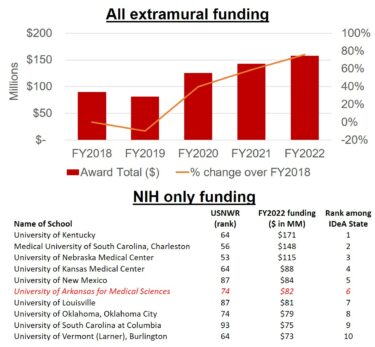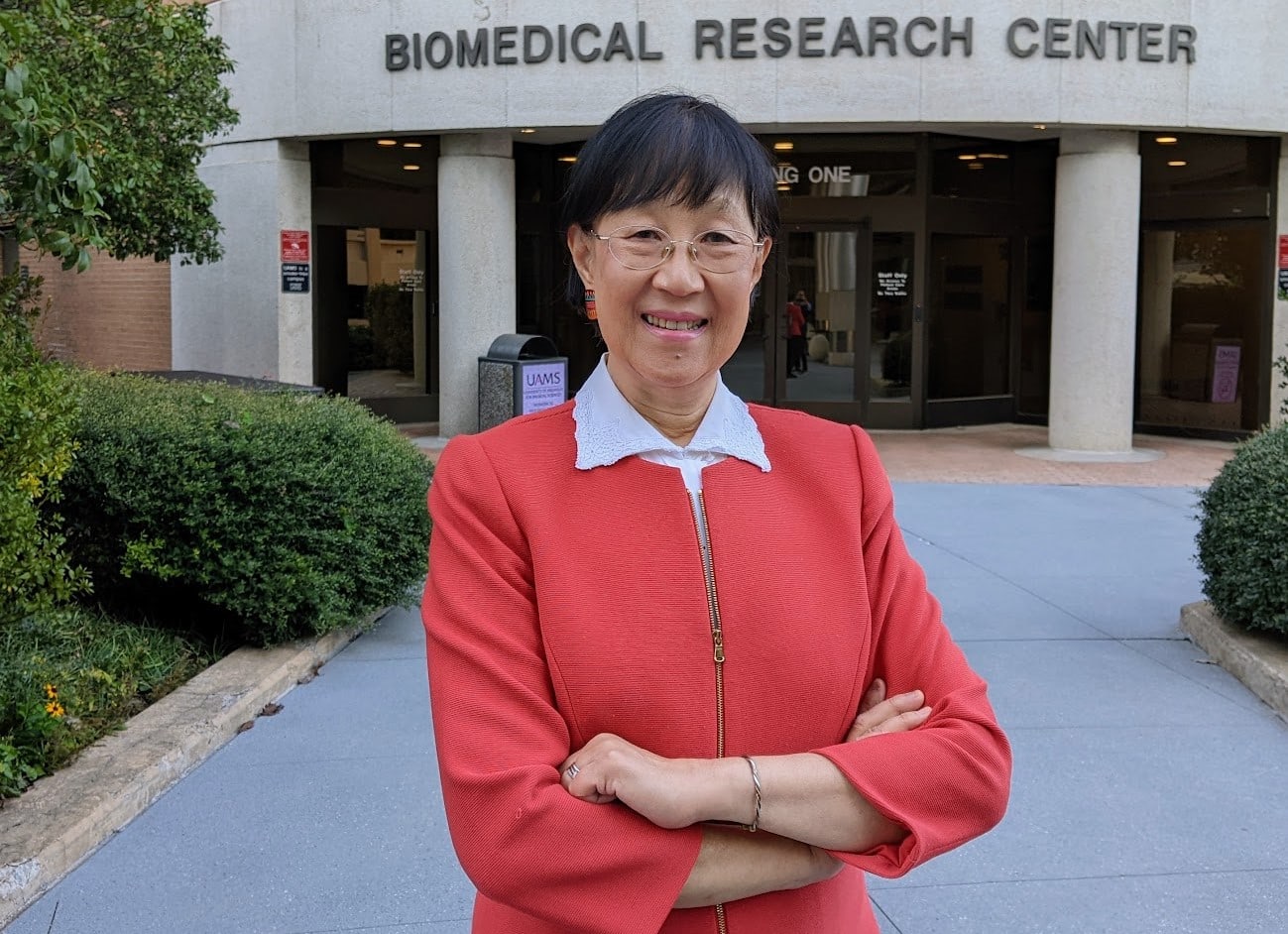UAMS Researchers See 14.5% Increase in Grant Funding for FY2022
| LITTLE ROCK — The University of Arkansas for Medical Sciences (UAMS) and its affiliate research institutions saw research funding grow by 14.5% this past year, with $203.1 million in grants by June 30, 2022, the end of the state’s fiscal year.

This chart illustrates the growth in all of UAMS’ external funding, as well as its NIH-funding rank among NIH IDeA states.
It is the third consecutive year with double-digit increases in research funding that comes from outside the institution. In fiscal year 2021, UAMS and its researchers at Arkansas Children’s Research Institute (ACRI) and Central Arkansas Veterans Healthcare System (CAVHS) received $177.4 million in grants, a 12.2% increase over fiscal year 2020.
Shuk-Mei Ho, Ph.D., UAMS vice chancellor for Research and Innovation, announced the latest grant totals at “Salute to Excellence in Research and Innovation,” a year-end program hosted by the Division of Research and Innovation to celebrate UAMS’ remarkable growth in research funding of near 80% in five years.
UAMS grant funding (not including ACRI and CAVHS), has grown from $89.8 million in 2018 to $157.9 million over the past five years.
“We have a five-year trend of steady progress toward meeting our short-term and long-term goals,” Ho said. “All of the colleges and all of the units are putting their best foot forward. Most importantly, this impressive growth of our faculty research would not have been possible without the support of a group of highly dedicated research administrative professionals in the Division of Research & Innovation.”
Notably, Pearl McElfish, Ph.D., MBA, who directs the Office of Community Health & Research at the UAMS Northwest Regional Campus, led all researchers with 11 grants totaling $18.3 million for fiscal year 2022.
“The strong, continued growth of the UAMS research enterprise — both in terms of funding and number of grants awarded — shows how UAMS scientists are delivering on the vision to dramatically improve health and health care in Arkansas,” said Stephanie Gardner, Pharm.D., Ed.D., UAMS provost and chief strategy officer. “UAMS is proud of its thriving community of researchers and the impact their work is having, from the community level to the health of the population.”
In UAMS’ 10-year Vision 2029 strategic plan, Ho aims to put the institution among the top three National Institutes of Health (NIH)-funded Institutional Development Award (IDeA) states. There are 23 IDeA states, plus Puerto Rico, established by Congress in 1993 to broaden the geographic distribution of NIH funding. UAMS now ranks sixth among institutions in the IDeA states.
Ho has also set a goal for UAMS to be among U.S. News & World Report’s top three academic research centers in the national Centers for Disease Control and Prevention (CDC) Southern Region, which also includes Alabama, Louisiana, Mississippi, North Carolina, South Carolina and Tennessee. UAMS now ranks fifth in the region.
The bulk of UAMS’ external research grant funding is from NIH and other federal sources.
UAMS researchers work on the UAMS main campus, its eight regional campuses, and at its affiliates ACRI and CAVHS. They compete for grants with their counterparts at research institutions across the United States.
At ACRI, UAMS researchers in fiscal 2022 acquired $34.5 million, a 32.2% increase from the $26.1 million last year. With expertise in basic science and clinical and community-based research, ACRI researchers are addressing a broad spectrum of children’s health concerns including childhood nutrition, childhood obesity, food allergy, diabetes-related complications, and numerous childhood diseases including asthma and cancer.
At CAVHS, UAMS researchers in fiscal 2022 successfully competed for $10.7 million in grants from the Veterans Affairs Research and Development program and nonprofit Biomedical Research Foundation, compared to $8.5 million last year — a 26% increase. Funded research centers at CAVHS include the Pharmacogenomics Analysis Laboratory; the Geriatric Research, Education and Clinical Center; the South-Central Mental Illness Research, Education and Clinical Center; the Center for Mental Healthcare and Outcomes Research; and the Behavioral Health Quality Enhancement Research Initiative.
CAVHS’ basic and translational research include aging and cognitive decline, suicide prevention, bone metabolism, atherosclerosis, and more recently, effects of toxic exposures during military service.
Below are the top 20 funded researchers for FY 2022, including number of grants and total amount. (Note that amounts are annualized, not cumulative totals. For example, a researcher may have received a five-year, $5 million grant, but for this report, the amount listed would be $1 million).
- Pearl McElfish, Ph.D., MBA, professor, director, UAMS Office of Community Health & Research; 11 grant totaling $18,286,196
- Eduardo Ochoa Jr., M.D., associate professor, College of Medicine, Department of Pediatrics; two grants totaling $9,798,794
- Jeannette Lee,D., professor, UAMS Department of Biostatistics; Jessica Snowden, M.D., professor and chief, Division of Pediatric Infectious Disease; vice dean for Research, College of Medicine; four grants totaling $8,930,257
- Richard Turnage, M.D., vice chancellor for Regional Programs, interim chair, Department of Family and Preventive Medicine, College of Medicine, executive associate dean, College of Medicine; one grant totaling $5,907,027
- Christopher Charlton, director, broadband, Institute for Digital Health & Innovation; two grants totaling $4,648,184
- Laura James, M.D., professor, director, Translational Research Institute and UAMS associate vice chancellor for Clinical and Translational Research; one grant totaling $4,378,981
- Lawrence Cornett, Ph.D., distinguished professor, College of Medicine, Department of Physiology and Cell Biology; one grant totaling $4,036,991
- Carol Cornell, Ph.D., professor, chair, Department of Health Behavior and Health Education, and Pebbles Fagan, Ph.D., professor, both at Fay W. Boozman College of Public Health; one grant totaling $3,864,520
- Fred Prior, Ph.D., distinguished professor and chair, College of Medicine Department of Biomedical Informatics; 11 grants totaling $3,847,223
- Michael Mancino, M.D., professor, College of Medicine Department of Psychiatry; three grants totaling $3,650,000
- Marjan Boerma, Ph.D., professor, College of Pharmacy Department of Pharmaceutical Sciences; five grants totaling $2,889,523
- Hari Eswaran, Ph.D., professor, College of Medicine Department of Obstetrics and Gynecology; eight grants totaling $2,703,234
- Alan Tackett, Ph.D., professor, College of Medicine Department of Biochemistry and Molecular Biology; three grants totaling $2,574,251
- Shuk-Mei Ho, Ph.D., professor, College of Medicine Department of Pharmacology and Toxicology, UAMS vice chancellor for Research and Innovation; two grants totaling $2,516,169
- Charles A. O’Brien, Ph.D., professor, College of Medicine Department of Internal Medicine and Department of Orthopaedic Surgery; two grants totaling $2,381,369
- Krista Langston, MBA, executive director, Community Health & Research at UAMS Northwest Regional Campus; two grants totaling $2,143,945
- Joseph Thompson, M.D., professor, College of Medicine, director, Arkansas Center for Health Improvement; two grants totaling $1,768,019
- Joseph Sanford, M.D., director, Institute for Digital Health & Innovation; associate professor, College of Medicine Department of Anesthesiology and Department of Biomedical Informatics; two grants totaling $1,737,882
- Susan Emmett, M.D., MPH, associate professor, College of Medicine Department of Otolaryngology-Head and Neck Surgery; three grants totaling $1,648,484
- Mark Smeltzer, Ph.D., professor, College of Medicine Department of Microbiology and Immunology; two grants totaling $1,591,808
UAMS is the state’s only health sciences university, with colleges of Medicine, Nursing, Pharmacy, Health Professions and Public Health; a graduate school; a hospital; a main campus in Little Rock; a Northwest Arkansas regional campus in Fayetteville; a statewide network of regional campuses; and eight institutes: the Winthrop P. Rockefeller Cancer Institute, Jackson T. Stephens Spine & Neurosciences Institute, Harvey & Bernice Jones Eye Institute, Psychiatric Research Institute, Donald W. Reynolds Institute on Aging, Translational Research Institute, Institute for Digital Health & Innovation and the Institute for Community Health Innovation. UAMS includes UAMS Health, a statewide health system that encompasses all of UAMS’ clinical enterprise. UAMS is the only adult Level 1 trauma center in the state. UAMS has 3,485 students, 915 medical residents and fellows, and seven dental residents. It is the state’s largest public employer with more than 11,000 employees, including 1,200 physicians who provide care to patients at UAMS, its regional campuses, Arkansas Children’s, the VA Medical Center and Baptist Health. Visit www.uams.edu or uamshealth.com. Find us on Facebook, X (formerly Twitter), YouTube or Instagram.
###
